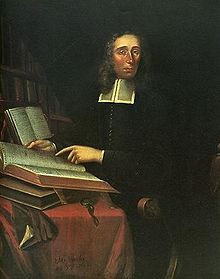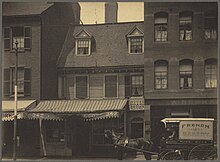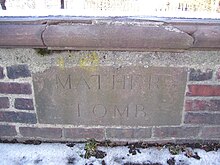Increase Mather

Increase Mather (born June 21, 1639 in Dorchester , Massachusetts Bay Colony , † August 23, 1723 in Boston , Province of Massachusetts Bay ) was a Puritan pastor . Not only did he play a politically important role in the history of the colony that became the present-day US state of Massachusetts , but also in the leadership of Harvard College and in the Salem witch trials . The first name Increase is the literal translation of the Hebrew name Yosëf .
Early life
Mather was born as the son of the Puritan pastor Richard Mather and his wife Kathrine Holt Mather after they emigrated in the course of the Great Migration because of their religious views against the Church of England . Increase was the youngest of six brothers, three of whom - as did his son Cotton Mather later - also chose the profession of pastor. His eldest brother was Samuel Mather , who was the only one of the Mathers to return permanently to England in 1650, where he became known as a preacher and later as the author of a systematic treatise on typological Bible exegesis .
education
Increase Mather began his education in 1651 at Harvard University , where he studied with Robert Massey, with whom he also shared a room. In 1656 he received a Bachelor of Arts degree and began his induction for the mission society ; he delivered his first sermon when he was 18 years old. Shortly thereafter, he left Massachusetts for Ireland , where he studied at Trinity College Dublin , where he received his Master of Arts degree in 1659 . He spent the next three years as a chaplain in a garrison in the Channel Islands .
During his stay at Trinity College, Oliver Cromwell approved him as a pastor for the Commonwealth and was also responsible for St. Tida's Church in Ballyscullion and for St. Swithan's Church in Magherafelt . After Cromwell's death in 1659, these positions were separated from each other.
In 1692 Mather received the first honorary doctorate in the New World from Harvard University .
Living in Massachusetts

With the advent of the Stuart Restoration and the resurgence of Anglicanism , Increase Mather returned to Massachusetts in 1661, where he married his stepsister Maria Cotton. In February 1663 their son Cotton Mather was born.
On May 27, 1664, he received his ordination as pastor of the Second Church in Boston , whose parishioners came mostly from the upper class and which also included many government officials. He held this office until his death and became one of the most influential people in the colony, both religiously and politically.
In 1676, Increase Mather published his work A Brief History of the War with the Indians in New England , which dealt with the King Philip's War .
Harvard University
On June 11, 1685 Mather was acting ( acting ) President of Harvard University, which at that time was still Harvard College . A little over a year later he was promoted to rector on July 23, 1686 and finally to president on June 27, 1692 . He held this position until September 6, 1701.
In fact, however, he was only sporadically present on campus or in the city; he only spent two of the six years as rector in the colony. Nevertheless, he was able to implement some changes, in particular the reintroduction of the teaching subjects Greek and Hebrew , the exchange of classical Roman authors by Biblical and Christian writers in ethics classes, an obligation for students to attend the courses regularly and to live and to live on campus food, as well as banning older students from bullying younger students.
Political commitment
Although politics and the Puritan understanding of religion were always closely linked in Mather, he did not appear politically until 1686 in connection with the suspension of the Massachusetts Charter by James II and the establishment of the Dominion of New England . The Dominion, led by Governor Edmund Andros , brought a variety of changes with it, many of which were contrary to the beliefs and views of the Puritans. When Increase Mather successfully launched a countermovement to repeal the charter, he narrowly escaped charges of treason . Thereupon he traveled to London - by tricking spies on him - to convince the king of his views.
To gain support for his point of view, Mather published such works as A Narrative of the Miseries of New-England, By Reason of an Arbitrary Government Erected there Under Sir Edmund Andros (1688) and A Brief Relation for the Confirmation of Charter Privileges (1691) . He also tried first to reactivate the old charter and obtain another charter for Harvard; However, he soon dropped these goals and changed his requests to a new charter which contained each of the rights mentioned in the original charter.
After the Glorious Revolution and the overthrow of Andros following the uprising in Boston in 1689, a new charter was issued for the colony in 1692, which - in addition to some organizational and legal changes compared to the old charter - united Massachusetts with the Plymouth Colony . Mather then returned to Massachusetts with the new governor he had chosen, William Phips , where they arrived on May 14, 1692.
The university administration at Harvard increasingly insisted that Mather live near the university. However, since he did not want to leave his community, Mather eventually resigned from the office of president.
The Salem witch trials
An influential man who handpicked Governor Phips and Lieutenant Governor William Stoughton , Increase Mather was also implicated in the Salem witch hysteria . At the beginning of the court hearings in the Salem witch trials , his son Cotton wrote a letter entitled The Return of Several Ministers Consulted , which warned of general caution but did not condemn the use of delusions as evidence ( spectral evidence ). In June and July 1692 Mather gave several sermons with which he wanted to calm the heated mood.
In September he published Cases of Conscience Concerning Evil Spirits , which on the one hand defended the judges and the judicial process, but on the other hand strongly condemned the use of delusions as admissible evidence. The text contains the following sentence:
"It were better that Ten Suspected Witches should escape, than that one Innocent Person should be Condemned."
"It would be better for ten suspected witches to escape than for one innocent person to be convicted."
This expression was taken up by William Blackstone in 1765 and went down in the history of criminal law as the Blackstone formulation : "It is better for ten guilty people to flee than for an innocent person to suffer."
Increase Mather's reputation did not suffer from his involvement in the trials or from his subsequent refusal to convict them.
Late life
After Maria's death in August 1714, Increase Mather remarried. In the following years his health got worse and worse; on September 27, 1722, he passed out and became bedridden . He suffered bladder failure in August 1723 and died three weeks later on August 23, 1723. He was buried at Copp's Hill Burying Ground in Boston.
Religious attitude
Throughout his life, Increase Mather was a strict puritan and consequently against anything that subtly or obviously questioned his religious beliefs. He declined alcohol consumption , unnecessary exertion on Sundays and sumptuous clothing , but supported the possibility of only partial church membership. He firmly believed in the direct, everyday manifestation of God's resentment that he saw in weather as well as in political situations, Indian attacks, outbreaks of fire, floods and other things.
He always tried to convince other people of his morals, mainly using the Jeremiad to prevent indifference and to induce government officials to enforce the public morals valid at the time.
In his functions at Harvard University, he regularly prevented the softening of puritanical rigor, as had arisen, for example, through Latitudinarism during his stay in England.
Own works (selection)
The most important among his more than 125 published works are:
- The Mystery of Israel's Salvation (1669)
- The Life and Death of That Reverend Man of God, Mr. Richard Mather (1670)
- Wo to Drunkards: Two sermons Testifying against the Sin of Drunkenness (1673)
- The Day of Trouble Is Near (1674)
- A Discourse concerning the Subject of Baptisme (1675)
- The Wicked Mans Portion (1675)
- Catechismus Logicus (1675), translated from Latin into English and edited by Rick Kennedy and Thomas Knoles, in: Proceedings of the American Antiquarian Society 109 (1999), pp. 183-223.
- A Brief History of the Warr With the Indians in New-England (1676) Online
- An Earnest Exhortation To the Inhabitants of New-England (1676) Online
- A Relation of the Troubles which Have Hapned in New-England by Reason of the Indians There from the Year 1614 to the Year 1675 (1677)
- A Discourse concerning the Danger of Apostasy (1679)
- The Divine Right of Infant-Baptisme Asserted and Proved from Scripture and Antiquity (1680)
- A Confession of Faith Owned and Consented unto by the Elders and Messengers of the Churches Assembled at Boston (1680)
- Heavens Alarm to the World (1681)
- Diatriba de signo Filii Hominis, et de secundo Messiæadventu; ubi de modo futuræ judæorum conversionis; nec non de signis novissimi diei, disseritur (1682)
- Kometographia, or, A Discourse concerning Comets (1683)
- An Essay for the Recording of Illustrious Providences (1684)
- An Arrow against Profane and Promiscuous Dancing Drawn out of the Quiver of Scriptures (1684)
- The Mystery of Christ Opened and Applied in Several Sermons concerning the Person, Office, and Glory of Jesus Christ (1686)
- De successu evangelij apud Indos in Novâ-Angliâ epistola (1688)
- A Narrative of the Miseries of New-England, by Reason of an Arbitrary Government Erected There under Sir Edmond Andross (1688)
- Cases of Conscience Concerning Evil Spirits (1693)
- A Further Account of the Tryals of the New-England Witches (1693)
- Angelographia, or, A Discourse concerning the Nature and Power of the Holy Angels (1696)
- The Order of the Gospel, Professed and Practised by the Churches of Christ in New-England (1700)
- The Blessed Hope, and the Glorious Appearing of the Great God our Savior, Jesus Christ (1701)
- Ichabod: or, The Glory Departing (1702)
- Soul-saving Gospel Truths (1703)
- A Discourse concerning Earthquakes (1706)
- A Dissertation concerning the Future Conversion of the Jewish Nation (1709)
- Meditations on the Glory of the Heavenly World (1711)
- A Disquisition concerning Ecclesiastical Councils (1716)
literature
- Mather, Richard . In: James Grant Wilson, John Fiske (Eds.): Appletons' Cyclopædia of American Biography . tape 4 : Lodge - Pickens . D. Appleton and Company, New York 1888, p. 251–256 (English, full text [ Wikisource ]).
- Michael G. Hall: The last American Puritan . the life of Increase Mather, 1639-1723. Wesleyan University Press, Middletown CT 1988, ISBN 978-0-8195-5128-3 .
- Thomas J. Holmes et al. a .: Increase Mather - a bibliography of his works . Cleveland OH 1931.
- Mason I. Lowance: Increase Mather . Twayne Publishers, New York 1974, ISBN 978-0-8057-0477-8 .
- Robert Middlekauff : The Mathers - three generations of Puritan intellectuals, 1596-1728 . Oxford University Press, New York 1971, ISBN 978-0-19-501305-4 .
- Kenneth B. Murdock: Increase Mather, the foremost American Puritan . Harvard University Press, Cambridge MA 1925, OCLC 466333 .
Web links
- Literature by and about Increase Mather in the WorldCat bibliographic database
Individual evidence
- ↑ a b c d e f g h i j Mather, Increase, 1639–1723. Papers of Increase Mather, 1639-1717. UAI 15,860. In: Harvard University Archives. Harvard University, accessed November 20, 2014 .
- ↑ Richard Mather. (No longer available online.) Dorchester Atheneum, archived from the original September 6, 2006 ; accessed on November 20, 2014 (English).
- ^ Mather, Richard . In: Encyclopædia Britannica . 11th edition. tape 17 : Lord Chamberlain - Mecklenburg . London 1911, p. 885 (English, full text [ Wikisource ]).
- ↑ a b c d Mather, Increase . In: Encyclopædia Britannica . 11th edition. tape 17 : Lord Chamberlain - Mecklenburg . London 1911, p. 883 (English, full text [ Wikisource ]).
- ^ Increase Mather: A Brief History of the War with the Indians in New England (1676) . An Online Electronic Text Edition. Ed .: Paul Royster (= Faculty Publications . Paper 31). University of Nebraska-Lincoln, Nebraska ( online [PDF; accessed November 24, 2014]).
- ↑ a b Biography of Increase Mather. Retrieved November 24, 2014 .
- ^ Mathew Madden: Increase Mather. (No longer available online.) In: Salem Witch Trials Documentary Archive and Transcription Project. Archived from the original on October 16, 2014 ; accessed on November 24, 2014 . Info: The archive link was inserted automatically and has not yet been checked. Please check the original and archive link according to the instructions and then remove this notice.
- ^ Increase Mather Papers, 1659-1721. Massachusetts Historical Society , accessed November 27, 2014 .
| predecessor | Office | successor |
|---|---|---|
| John Mayo | Pastor of the Second Church in Boston 1673–1723 |
Cotton Mather |
| personal data | |
|---|---|
| SURNAME | Mather, Increase |
| ALTERNATIVE NAMES | Mathero, Crescentio; Matherus, Crescentius |
| BRIEF DESCRIPTION | puritan pastor |
| DATE OF BIRTH | June 21, 1639 |
| PLACE OF BIRTH | Dorchester , Massachusetts Bay Colony |
| DATE OF DEATH | August 23, 1723 |
| Place of death | Boston , Province of Massachusetts Bay |

